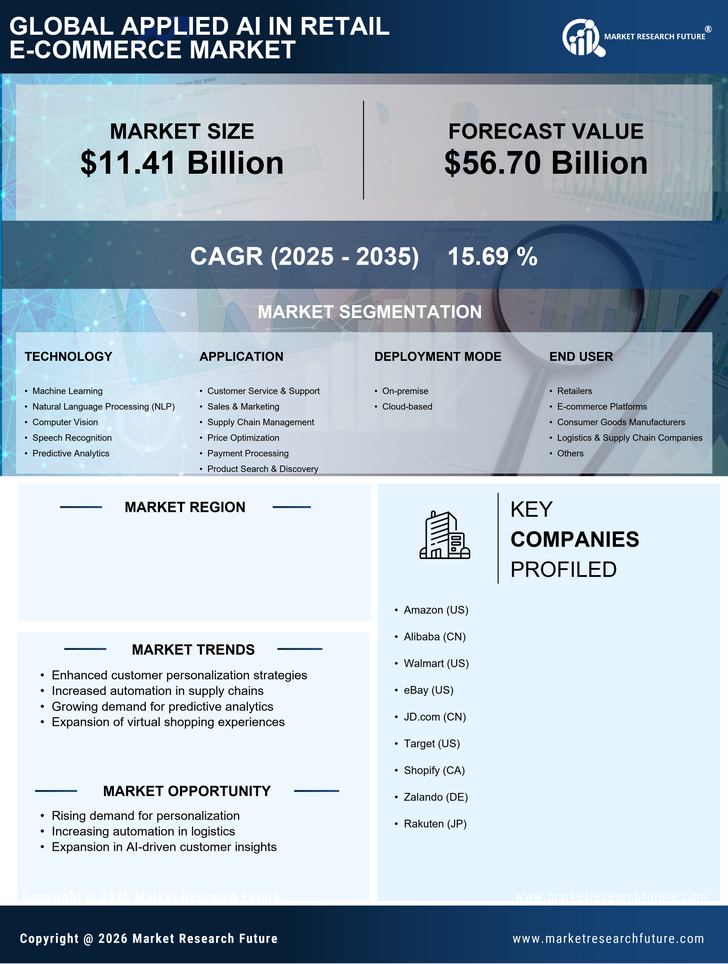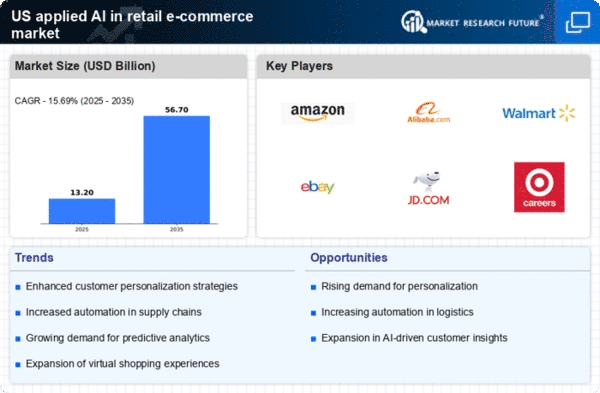Data-Driven Decision Making
The applied ai-in-retail-e-commerce market is increasingly influenced by the ability of retailers to leverage data analytics for informed decision-making. Retailers are utilizing AI algorithms to analyze vast amounts of consumer data, enabling them to identify trends, preferences, and purchasing behaviors. This data-driven approach allows for more accurate forecasting and inventory management, which is crucial in a competitive landscape. According to recent estimates, retailers that implement AI-driven analytics can improve their operational efficiency by up to 30%. As a result, the applied ai-in-retail-e-commerce market is witnessing a surge in demand for AI solutions that facilitate data analysis, ultimately leading to enhanced profitability and customer satisfaction.
Integration of Voice Commerce
The integration of voice commerce is emerging as a transformative driver in the applied ai-in-retail-e-commerce market. With the proliferation of smart speakers and voice-activated devices, retailers are increasingly optimizing their platforms for voice search and shopping. This shift allows consumers to make purchases through voice commands, enhancing convenience and accessibility. Recent studies suggest that voice commerce could account for over $40 billion in sales by 2025. As retailers adapt to this trend, the applied ai-in-retail-e-commerce market is likely to see a significant increase in AI solutions that facilitate voice interactions, ultimately reshaping the shopping experience.
Enhanced Fraud Detection Mechanisms
Fraud detection remains a critical concern in the applied ai-in-retail-e-commerce market. Retailers are increasingly deploying AI-driven solutions to identify and mitigate fraudulent activities. These systems utilize machine learning algorithms to analyze transaction patterns and detect anomalies that may indicate fraud. The implementation of such technologies can lead to a reduction in fraudulent transactions by as much as 50%, thereby safeguarding revenue and enhancing customer trust. As the e-commerce landscape evolves, the demand for robust fraud detection mechanisms is likely to grow, further propelling the applied ai-in-retail-e-commerce market as retailers seek to protect their operations and customers.
Automation of Supply Chain Processes
The automation of supply chain processes is a pivotal driver in the applied ai-in-retail-e-commerce market. Retailers are increasingly adopting AI technologies to streamline logistics, inventory management, and order fulfillment. By automating these processes, businesses can reduce operational costs and improve delivery times. For instance, AI-powered systems can predict demand fluctuations, allowing retailers to optimize stock levels and minimize waste. Reports indicate that companies utilizing AI in their supply chains can achieve cost reductions of up to 20%. This trend not only enhances efficiency but also positions retailers to respond swiftly to market changes, thereby strengthening their competitive edge in the applied ai-in-retail-e-commerce market.
Customer Insights through Predictive Analytics
Predictive analytics is becoming a cornerstone of strategy in the applied ai-in-retail-e-commerce market. Retailers are harnessing AI to gain insights into future consumer behavior, enabling them to tailor marketing efforts and product offerings accordingly. By analyzing historical data and identifying patterns, businesses can anticipate customer needs and preferences, leading to more effective engagement strategies. It is estimated that companies employing predictive analytics can increase their sales by up to 15%. This capability not only enhances customer satisfaction but also drives revenue growth, making predictive analytics a vital component of the applied ai-in-retail-e-commerce market.

















